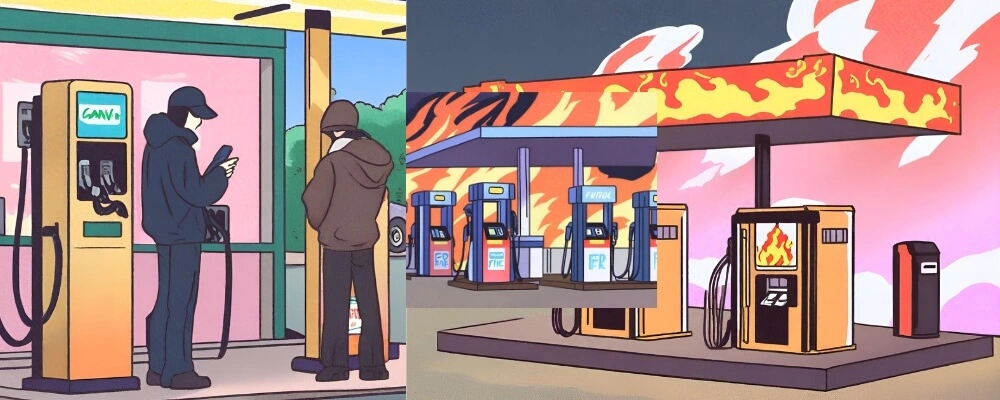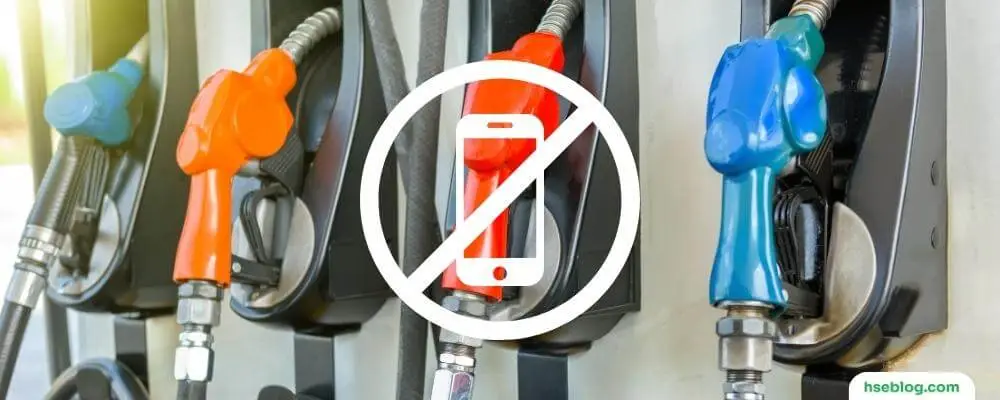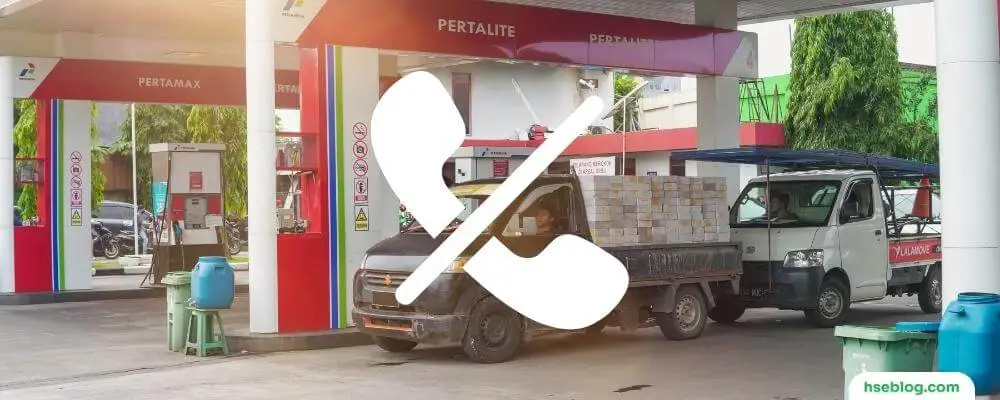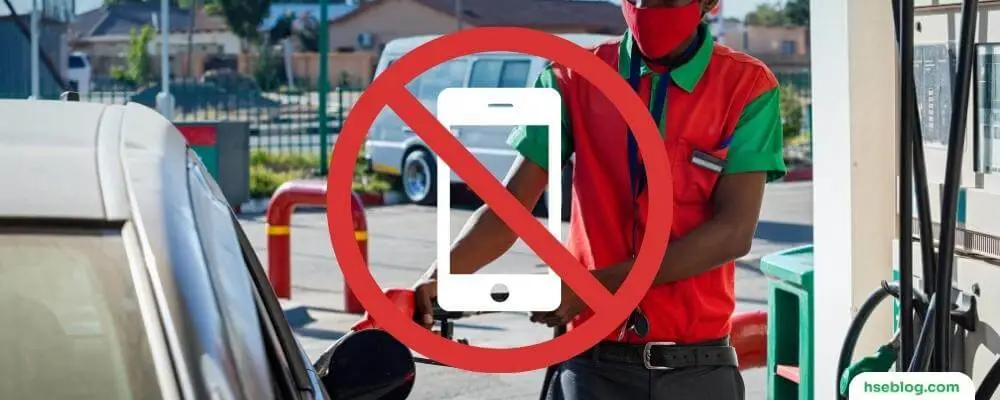In our hyper-connected society, our smartphones seem to have become extensions of our hands. However, there’s one place where you might want to think twice before pulling out your phone – the petrol station. You’ve likely seen the signs, heard the announcements, or read the warnings against using mobile phones at petrol stations, but how much do you know about the reasons behind these warnings?
In this blog post, we delve into the subject of ‘Why Can’t You Use Your Phone At A Petrol Station?’. Despite much debate and many myths surrounding the subject, the rationale for these safety precautions is grounded in plausible risk factors for you, the people around you, and the infrastructure itself.
We will explore the potential dangers, including fire risks, distraction-related accidents, legal implications, and personal security issues. Additionally, we’ll provide clear guidance on safety rules to follow at petrol stations. So, keep reading to understand why putting your phone away while refueling is essential. It’s a small step that goes a long way in ensuring everyone’s safety.
Why You Should Not Use Phone At Petrol Stations?
Petrol stations are one of the most dangerous places to work. Every year, there are reports of petrol station attendants being injured or killed in accidents. Traffic stations present many hazards, such as flammable liquids, high-pressure hoses and pumps, and vehicles moving around the forecourt.
Petrol station staff must be aware of these hazards and take precautions to protect themselves. Following are some reasons you should not use the phone at petrol stations.

1. It’s a fire hazard
Using your phone at a petrol station poses a theoretical risk of ignition, leading to potentially catastrophic fires. This is due to the highly flammable nature of gasoline and the vapours it emits, which can ignite if exposed to a spark or sufficient heat.
While it’s debatable whether a mobile phone can generate a spark powerful enough to ignite gasoline fumes, the theoretical risk does exist. This can happen in two ways. First, if the battery malfunctions or is damaged, it could potentially cause a spark. This is rare, but the risk is not zero. Second, when a phone is dropped, the impact could potentially create a spark, especially if the battery becomes dislodged or damaged.
Further, it’s not just the liquid petrol that’s the issue. The gasoline’s vapours are heavier than air, meaning they don’t easily disperse and can gather in concentrations sufficient to ignite. Even a small spark in such an environment could cause a rapid, explosive fire.
The risk, however minimal, is amplified by the potentially devastating consequences. A fire at a petrol station can lead to massive explosions, causing extensive damage, injuries, or even loss of life. Therefore, out of an abundance of caution, many experts and authorities recommend not using mobile phones while refuelling at petrol stations.

2. Risk of Accidents Due to Distraction
Operating your phone at a petrol station may cause undue distraction, significantly raising the chance of a mishap or accident. When you’re engrossed in a call, text, or app, your attention is divided and not entirely focused on the task at hand – which, in this case, involves handling a volatile and potentially dangerous substance like petrol.
Distractions can lead to errors, ranging from minor mishaps to potentially hazardous situations. For instance, you could inadvertently overfill your tank, causing petrol to spill. A spill wastes fuel and creates a fire hazard, as spilled petrol can easily ignite if it comes into contact with a spark or flame.
Furthermore, you might forget to properly secure the fuel pump after refuelling, leaving it unattended and posing risks to other patrons or vehicles. In extreme cases, you could drive off with the pump still attached to your vehicle, causing damage to the station’s equipment and potentially leading to dangerous fuel leaks.
Lastly, distraction can also delay your response time to any unexpected occurrences. For example, if a small fire were to start, a distracted person might not notice it immediately, losing precious seconds that could be used to prevent a more serious incident. Thus, maintaining focus and awareness while at a petrol station is critical for your safety and those of others around you. Staying off your phone during this time is a simple and effective way to ensure this.
3. Legal Implications in Certain Jurisdictions
Using your phone at a petrol station isn’t merely frowned upon; in some parts of the world, it’s legally prohibited. Regulations vary across jurisdictions, but the underlying concern is the potential safety hazards such behaviour can create.
These laws are established to minimize distractions and potential ignition sources in these potentially volatile environments. A mishap at a petrol station, as outlined in previous points, can have severe repercussions ranging from personal injury to extensive property damage. Hence, authorities have deemed it necessary to introduce and enforce such regulations to enhance safety protocols.
In jurisdictions where using a phone at a petrol station is illegal, penalties can include fines, points on your driving record, or even the suspension of your driver’s license in more severe cases. These regulations are enforced to varying degrees, but their existence underscores the seriousness of this issue.
Even if it’s not explicitly illegal in your location, many petrol stations have policies that strongly discourage or outright forbid the use of mobile phones while refuelling. These policies are usually communicated through warning signs and announcements at the station. Using a phone at a petrol station can be viewed as a legal liability and a safety risk. Hence, it’s important to be aware of the laws in your particular area and to respect the guidelines set by individual petrol stations.

4. Risk of Phone Falling into Petrol
Utilizing your phone at a petrol station poses the risk of accidentally dropping it into the petrol. This scenario is problematic for two primary reasons.
First, if your phone slips out of your hand and falls into the petrol, it would likely suffer significant damage. Modern smartphones are intricate pieces of technology that don’t react well to being submerged in any liquid, let alone petrol. Petrol could corrode the internal components of your phone, rendering it inoperable. Depending on the model of your phone and its level of water resistance (which doesn’t translate to petrol resistance), this could lead to a costly replacement or repair.
Second, and more critically, the fall could potentially create a spark, as mentioned earlier. If your phone strikes a hard surface, the impact could cause the battery to malfunction, producing a spark. This spark could trigger a fire or even an explosion in the presence of petrol and its flammable vapours.
Even if the chances of this happening are relatively slim, the consequences could be dire, including extensive damage to the petrol station, injury to you and others present, or even loss of life. This underlines why it’s prudent to avoid using your phone when handling petrol at a station.

5. Vulnerability to Theft
Being engrossed in your phone at a petrol station can increase your susceptibility to theft. When you’re absorbed in a call, messaging, or browsing, your attention is diverted away from your immediate environment, potentially making you an easier target for opportunistic thieves.
In the context of a petrol station, this could take multiple forms. For instance, a thief might seize the opportunity to steal valuables from your car while you’re distracted. Unattended purses, wallets, laptops, or other valuable items can be quickly and easily taken without you noticing. Moreover, if your vehicle is left unlocked, there’s also the risk of car theft. Thieves can exploit your momentary distraction to access your vehicle and steal it outright or take items within.
In extreme scenarios, if you’re deeply immersed in your phone, you could even fall victim to a mugging. Therefore, remaining aware of your surroundings at a petrol station is crucial. Avoiding phone use can help maintain this awareness, reducing your vulnerability to opportunistic crimes. Staying vigilant ensures your safety and the security of your personal belongings.
6. Courtesy to Others
Using your phone at a petrol station, especially if you’re engaged in a call, can be seen as discourteous to others. Holding up the queue because you’re distracted by a conversation on your phone can be frustrating for people waiting in line. Similarly, if you’re playing music or videos loudly on your phone, it can be disruptive to others around you. Maintaining a certain level of decorum in public spaces, including petrol stations, is a part of good etiquette.
7. Encourages Bad Habits
Regularly using your phone while at a petrol station can foster a habit of multitasking while handling potentially dangerous tasks. This could extend beyond the petrol station scenario and could cause accidents in other areas of life where focus and undivided attention are crucial for safety.

Safety Rules To Follow At Petrol Stations
Adhering to safety rules at petrol stations is of utmost importance due to the inherent risk of handling flammable substances. Here are some essential safety guidelines to follow when you’re at a petrol station:
- No Smoking: Do not smoke, light matches, or use lighters at the petrol station. Any open flame can ignite petrol vapours, leading to a fire or explosion.
- Turn Off Your Vehicle: When refuelling, make sure your vehicle’s engine is off. This can prevent accidental movement and reduce a spark’s chance of igniting fumes.
- Avoid Using Electronic Devices: As discussed, mobile phones or other electronic devices can pose potential hazards. While the actual risk might be low, avoiding using these devices while refuelling is safer.
- Don’t Overfill Your Tank: Overfilling can cause spills, posing a safety hazard and harming the environment. Once the pump’s automatic nozzle clicks off, do not attempt to add more fuel.
- Use Only Approved Containers for Fuel: If you need extra fuel, use only containers approved for petrol storage. These containers are designed to safely store petrol and minimize the risk of leaks.
- Keep an Eye on the Nozzle: Do not leave the fuel pump unattended while refuelling. Always maintain control of the nozzle to prevent spills and accidental overflows.
- Avoid Re-Entering Your Vehicle: Re-entering your vehicle during refuelling can generate static electricity, which can spark a fire. If you must re-enter your vehicle, discharge any static electricity by touching a metal part of the vehicle with a bare hand before touching the nozzle again.
- Emergency Procedures: Familiarize yourself with the location of emergency shut-off switches and fire extinguishers at the petrol station. In case of a fire, your priority should be to get to safety and alert station employees so they can take appropriate action.
- Maintain Awareness of Your Surroundings: Be aware of the activities around you. Watch for spills, suspicious behaviour, or any other potential hazards.
- Follow Posted Guidelines: Always obey the rules and guidelines posted at each petrol station. These may vary by location, but they are designed to ensure the safety of everyone.
Safety at petrol stations is a shared responsibility. Adhering to these rules can help ensure a safe environment for everyone.
Conclusion
In conclusion, while the risks associated with using a mobile phone at a petrol station might seem remote or even exaggerated, it’s clear that caution and safety should be paramount. The consequences of an accident at a petrol station can be catastrophic, and anything that can potentially reduce these risks, including avoiding phone use, should be encouraged.
Moreover, beyond the possible physical dangers, using your phone at a petrol station can have other unintended consequences, from legal penalties in certain jurisdictions to increased vulnerability to theft. Lastly, it’s also worth considering the social aspects. Respecting the guidelines set by the petrol stations and local laws demonstrates a commitment to collective safety and consideration for others.
So, the next time you pull into a petrol station, remember to put your phone away until you’re done refuelling. It’s a simple act, but it contributes to your safety, the safety of others around you, and the smooth operation of the petrol station.
With that, we hope this blog post has provided valuable insights into why you shouldn’t use your phone at a petrol station and has inspired you to cultivate safer habits. Thank you for reading, and stay safe!

